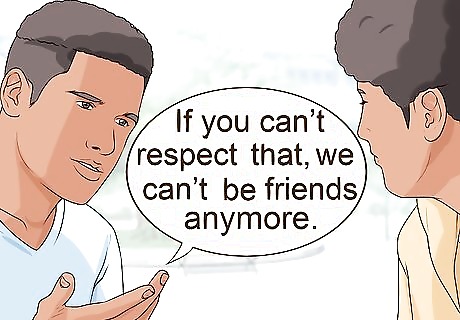
views
Clarifying Your Identity

Identify your personal values. Being an adult emotionally means having an understanding of what you believe in and stand for. Your personal values are like the roadmap that guides you through life. They are the principles and ideas that drive your decisions and goals. When your values align with the choices you make in daily life, you feel more confident. Identify your values by asking yourself: What issues are you passionate about debating or learning about? Why? If your house was on fire (and all living beings were safely out) what three items would you rescue? Why? What would you like to change about your local community? What would you like to change about the world in general, and why?

Complete the best possible future self exercise. In addition to defining your personal values, your emotional development can also be improved by determining what you want your future to look like. You can do this by performing the Best Possible Self exercise developed by positive psychologists. Choose a time period in the future (e.g. 5 years from now) and envision yourself being the very best version of you. See your best possible self clearly and vividly. See all the goals you have worked hard to achieve. You may have just passed a milestone or realized one of your major life dreams. Write down the details of the image you see. Now, define which character strengths will be necessary—those that you already hold and those you may need to develop—for you to make this vision a reality. Another similar option is to create a vision board. You can decorate a poster board with magazine clippings, drawings, and words and phrases that represent the short and long-term goals that you would like to achieve. Then, place the poster board where you will see it every day. As you grow and change, you can add, adjust, or remove things from the poster board.

Reject conformity—be you. Another quality of an emotionally mature adult is being able to securely be who you are, without shame or fear. Adolescents and young adults are often susceptible to peer pressure, following the masses based on personal interests, style, and even behaviorism. As you mature, it is important to move past this conformist attitude in favor of having the courage and self-awareness to just be you. Even as a teenager, you have the ability to be independent in many ways. Remember that it is okay if people don’t agree with you all of the time or if you have different interests and goals compared with your peers. Take the time to be your own unique self. Do or say something on a daily basis that expresses who you are without concern for the approval of others. Remember what you enjoyed doing as a child, and reconnect with these interests or hobbies. Get comfortable with solitude. Spend some time each day connecting with your deepest, truest self outside the presence of others.
Developing Autonomy

Learn problem-solving skills. An important transition into adulthood relates to being able to analytically think through dilemmas to derive solutions. An emotionally immature person might easily become frustrated or even give up when they face problems. You will constantly encounter challenges in life, and an essential skill is figuring out how to effectively move through them. Follow these tips to enhance your problem-solving ability for greater emotional maturity. Be open-minded. Don’t cut yourself off from possible solutions simply because the route is foreign or seems out-of-the-box. Focus on the end goal. Rather than dwelling on the issue, think in terms of what actions can help you reach a workable solution. Change your language. Instead of using the word “problem,” try “challenge.” It doesn’t seem so difficult when you use this word.

Learn from your mistakes. An emotionally mature adult is able to go through hardships and glean a lesson from them. Even mature adults make mistakes, but the difference is being able to learn from them through behavioral growth. Recognize when you have messed up. Then, look at the variables and consider what you could have done differently and what you gained from having gone through the ordeal. For example, if you are fired from a job because you are consistently late, you can learn from this experience. At your next job, being on time should be a top priority. In addition, you may want to show more accountability by calling ahead when you just can’t help being late.

Consider others’ opinions, but make your own decisions. Whether you are in late adolescence or early adulthood, you will find that a hallmark of becoming emotionally mature is autonomous decision-making. Emotionally immature adolescents and adults may put off decisions because they fear making a choice or simply follow the paths of those around them. Meanwhile an emotionally mature adult is able to weigh the pros and cons of a situation, take time to ponder their options (i.e. don’t make rash decisions, but also don’t delay making a choice either), and move forward with confidence once the choice has been made. Emotionally mature adults may seek the advice of those around them, but they do not allow others to cloud their own judgment. In the end, they will make a decision alone based on careful consideration.

Ask for help when you need it. Being emotionally mature entails making solo decisions, solving problems, and learning from your mistakes. However, an emotionally mature adult also uses their judgment to recognize when they require assistance. Of course, it’s important to take responsibility for your own life. But, you will undoubtedly encounter problems that cannot be overcome alone. In these times, you must have the courage to ask for help. Scientists recommend practicing asking for help by requesting the assistance of others in small ways on a regular basis. Ask a friend to babysit for you, “Would you mind watching the baby this weekend?” Ask your college professor for a copy of the lecture, “Dr. Jordan, I didn’t quite understand today’s lecture. Do you have a copy of the slides so I can review them?” The more you ask for help in small ways, you will find it becomes easier. You will also notice that most people are happy to oblige your requests.
Gaining Emotional Intelligence

Be okay with both positive and negative emotions. One major characteristic of an emotionally mature adult is the ability to identify, understand and accept their feelings—both good and bad. Most people won’t have trouble accepting joy or excitement. However, you may have difficulty coping with sadness or rejection. Realize that feeling negative emotions is just as beneficial to your maturity as positive feelings. Emotions are simply a part of being human. Avoiding painful emotions like sadness can actually lead to bigger problems such as substance abuse or depression. When you accept all emotions, you learn to embrace your full humanity. Strive for acceptance by naming what you’re feeling. Describe it like “Right now, I feel rejected because I was not invited to the party. My throat is tight. I am also slightly angry and embarrassed. The tips of my ears are warm. These feelings will pass.”

Remember to pause. Self-control is at the core of emotional maturity. Just as you need to accept your emotions you also need to exert control over them by learning how to regulate your feelings. When you are not in control of your emotions you are at risk of acting in ways that you later regret. Emotional maturity involves restraint. Pause and fully identify what you are feeling, pinpoint the reason you are feeling this way, and carefully devise an appropriate action. For instance, if a friend shares your secret, you may be inclined to return the favor, telling one of theirs. By using self-control, you might rationalize that, although you feel angry, reciprocating a betrayal won’t make you feel any better. Instead you might choose to refrain from confiding in this person in the future.

Strive to develop empathy for others. An emotionally mature person is open-minded and able to see the humanity in others, even when they look or think differently. Empathy is vital to becoming emotionally mature because with this trait you learn that your opinions, interests or beliefs are not the only way. Empathy allows you to consider the emotional experience of others, which can help you strengthen your bonds and avoid misunderstanding. Increase empathy by paying more attention to the body language and temporary facial expressions of others. Consider how these signals fit into the circumstance. Then, become more aware of your own signals. How do you stand when you are angry? What micro-expression (i.e. mini facial expression) do you make when you are embarrassed?

Develop healthy coping skills. Accepting and regulating your emotions is essential to emotional maturity, but you also need to know how to manage stress before it worsens. Building a stress-management toolbox can position you to have effective and helpful ways to release negative energy so that it doesn’t negatively affect your life. Think of activities that help you to relax and do them regularly to fend off stress. Consider writing about your problems in a journal, practicing meditation, calling a friend, taking a walk in nature, watching a funny movie, or listening to soothing music. In addition to adopting healthy practices, leading a healthier lifestyle also fights stress. Get 7 to 9 hours of sleep each night, eat a diet with an abundance of whole foods, drink plenty of water, and be physically active on most days of the week.
Interacting in an Emotionally Mature Way

Use your voice. A major hallmark of becoming emotionally mature is learning how to stand up for what you believe in. The best way to do this is by setting boundaries in your relationships. Think long and hard about how you want to be treated by parents, friends, romantic partners, and coworkers. Then, come up with a list of boundaries to share with these people. For instance, your friends crack jokes about your girlfriend. If you would like your friends to respect your relationship, you might enforce this by saying, “I asked if you could stop making jokes about Jennie. If you can’t respect that, we can’t be friends anymore.” It’s important to follow through when you set boundaries so that people take you seriously.

Avoid childish games in relationships. An emotionally mature adult doesn’t play games when it comes to matters of the heart. Playing mind games may make you feel in control or mysterious, but it actually jeopardizes the health of your bond with the other person. It also undermines trust. Resist the urge to score points or win favor and instead go for the truth. It can be hard at first, but recognize that vulnerability is an essential component in a successful relationship. Put simply, if you care for someone, have the courage to tell them. If you have a problem, don’t just withdraw. Try to work it out by candidly sharing your feelings with your partner. And, if you are no longer interested in someone, be kind enough to tell them face-to-face—before you move on to the next person.

Stand behind your word. A big part of being an emotionally mature man or woman is personal accountability. Be accountable to yourself and to others. If you make a promise to someone, follow through with it. If you set a goal, make a daily effort towards reaching it. Personal accountability allows you to be a person of integrity. When people can depend on you to do what you say, they are able to trust you. The next time you say “yes” to a favor or make a promise, do whatever is necessary to see it through. If you realize down the road that you shouldn’t have said “yes,” then you’ll know next time to carefully consider all requests before agreeing to them.




















Comments
0 comment